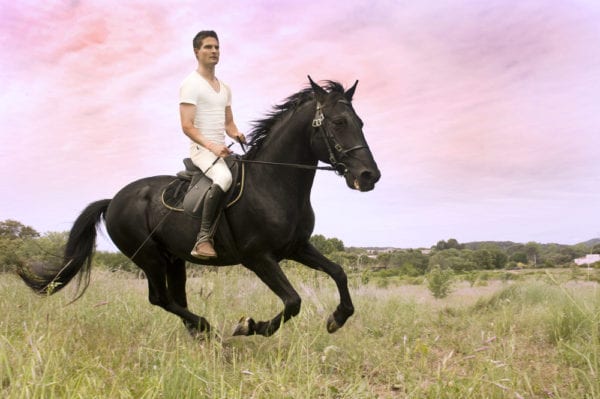Finding freedom and serenity on horseback in Concerto
Finding freedom and serenity on horseback in Concerto
Finding freedom and serenity on horseback in Concerto
-
Hannah
-
Hannah


The hero of my new novel, Concerto, is a man in pain, struggling in the darkness, both emotional and physical, brought on by going blind. When music therapist Catriona meets Umberto, she can see that there is much work to do if he is to live with passion and humour and joy again. But there is hope, for she can see that in one facet of his life he has found a way to be his old self.
‘Horses represent freedom,’ Umberto tells Catriona. After losing his sight, he worked with a trainer for blind riders, and now, with his trusty stallion Vulcan, he is able to ride around his estate on the shore of Lake Como.
For Umberto, time with Vulcan is time when he does not need to feel blind in the same way. When any rider learns to ride a horse they must understand that the foundation is to feel the horse and really engage with it.
In the book, Umberto takes Catriona out for a ride. Catriona is astonished to see Umberto mount his stallion with grace and agility. At first, they move slowly and gently, but soon Umberto coaxes Vulcan to pick up the pace into a rhythmic gallop. The ride is exhilarating, but Umberto is prepared to push even further. I write:
Umberto adjusted the reins in his hands. ‘Andiamo, let’s have a race. We’ll gallop down to the pergola. Can you see it? Down there, on the edge of the lake beside those cypresses.’
Race? Before Catriona could protest at the notion of competing downhill at a gallop with a blind rider, Umberto had launched Vulcan along a narrow track leading down to the valley in an alarmingly steep slope. His powerful legs clamped round Vulcan’s barrel as he crouched low over the stallion’s neck. Grabbing the lead rope, he settled deeply into the horse’s stride, letting reflexes ingrained by years on horseback take over. His mount ran like unleashed hell.
He’s going to break his neck, Catriona thought in alarm before following him in the mad descent.
The valley was reached in no time and soon they were galloping on a wide path on each side of which were planted a sea of mulberry trees with corrugated browny-orange trunks, short and wide, above which their many branches formed a full, spreading crown. Wings of the silvery blue waters of Lake Como flashed through gaps between the thin, satiny light-green leaves. Catriona relaxed a little; Umberto was an experienced rider and there was no doubt that Vulcan knew his way. Horse and rider were in total harmony, moving as one, and she was reminded of her teacher’s words at riding school: ‘Do what your horse does, and do in your body what you want your horse to do in his.’
The ride is glorious. The sense of freedom and calm for Umberto is glorious.
When I wrote this scene, I had in mind this quote from Shakespeare’s Henry V: ‘When I bestride him, I soar. I am a hawk: he trots the air; the earth sings when he touches it…’
There is such power in this sensation – power to inspire and soothe and liberate. But as Umberto tells Catriona, the trick is not to assume power, but to relinquish it. To ride as he does, he has to surrender his sense of control and go with the flow of the horse.
There is a spirituality to the riding. I am reminded of the Arabian proverb ‘The wind of heaven is that which blows between a horse’s ears’.
Now if only Umberto can surrender control with his music and go with the flow, perhaps he could compose once more. And if he could surrender control in his heart, perhaps he could find love at last.